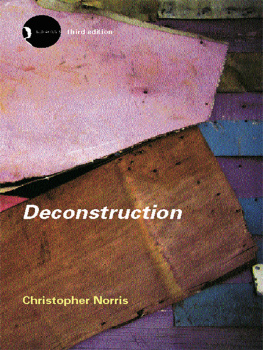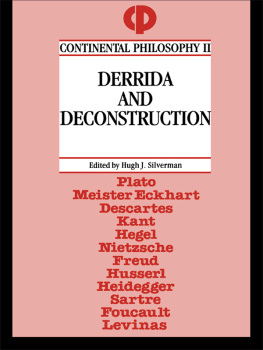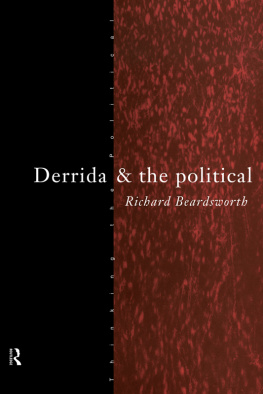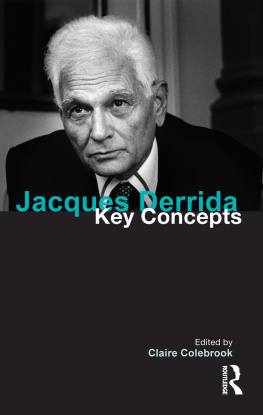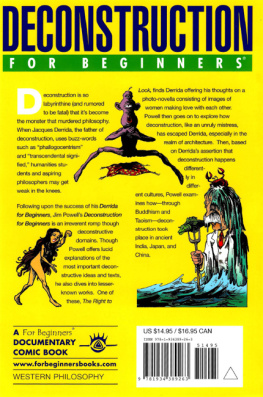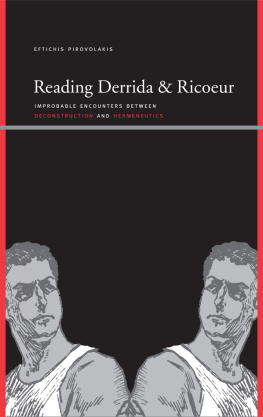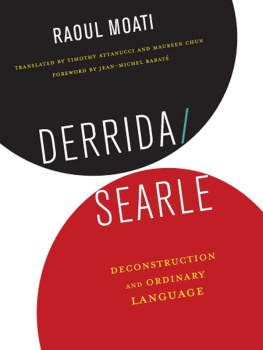Stanford University Press
Stanford, California
English translation 2014 by the Board of Trustees of the Leland Stanford Junior University. All rights reserved.
Politics of Deconstruction was originally published in German in 2011 under the title Jacques Derrida zur Einfhrung 2011, Junius Verlag, Hamburg.
No part of this book may be reproduced or transmitted in any form or by any means, electronic or mechanical, including photocopying and recording, or in any information storage or retrieval system without the prior written permission of Stanford University Press.
Printed in the United States of America on acid-free, archival-quality paper
Library of Congress Cataloging-in-Publication Data
Ludemann, Susanne, 1960 author.
[Jacques Derrida zur Einfuhrung. English]
Politics of deconstruction : a new introduction to Jacques Derrida / Susanne Ludemann ; translated by Erik Butler.
pages cm
Originally published in German in 2011 under the title Jacques Derrida zur Einfuhrung.
Includes bibliographical references.
ISBN 978-0-8047-8412-2 (cloth : alk. paper)
ISBN 978-0-8047-8413-9 (pbk. : alk. paper)
1. Derrida, Jacques. 2. Deconstruction. 3. Criticism. I. Title.
B2430.D484L83613 2014
194dc23
2014008594
ISBN 978-0-8047-9302-5 (electronic)
POLITICS OF DECONSTRUCTION
A New Introduction to Jacques Derrida
Susanne Ldemann
Translated by Erik Butler
STANFORD UNIVERSITY PRESS
STANFORD, CALIFORNIA
I dedicate the American edition of this book to my former colleagues and students at the University of Chicago, where most of it was written, and especially to those who participated in my graduate class on Derrida in winter 2011.
Contents
Preface: Derridas Legacy
It is one thing to determine and describe the opinions of philosophers. It is an entirely different thing to talk through [durchsprechen] with them what they are saying, and that means, that of which they speak.
Martin Heidegger, What is Philosophy?
We must begin wherever we are.... Wherever we are: in a text where we already believe ourselves to be.
When he died in Paris in October 2004, the philosopher Jacques Derrida was a kind of media star. Auditors from all over the world flocked to his lectures and crowded the halls of the cole Normale Suprieure, and later those of the cole des Hautes Etudes en Sciences Sociales. When he spoke of matters such as the politics of friendship or questions of responsibility, a battery of devices recorded his every word. Derrida, whose writings have been translated into forty languages, held guest-professorships and lectured across the globe, received honorary degrees from twenty-five universities, and gave countless interviews on philosophy and current events. Two films were made about him, which presented the avid public with a portrait of both the thinker and the man himself, in private life.
For a philosophereven one as prolific as Derridasuch publicity is unusual. The time has passed when philosophy played a leading role in the public sphere. Today, a lot of people are more likely to seek answers to the big questions from biology or the neurosciences. Moreover, Derridas celebrity stands in inverse relation to the difficulty his texts present. While deconstruction became a fashionable label for theoretical works in the 1980s and 1990s, few people actually bothered reading the texts that received this appellation. Indeed, the attention the media paid to the reception of Derridas writings often proved a hindrance inasmuch as they gave rise, especially in Germany and the United States, to dismissals of the philosopher as a charlatan and of his concerns as so many rhetorical obfuscations; needless to say, discounting Derrida in this way spared his critics the effort of actually reading what he had written.
The book at hand is not meant as a substitute for reading Derridas texts. Such an intention would be misplaced for at least two reasons: to begin with, the body of texts that appeared under the name of Jacques Derrida is too vast to be discussed and commentatedmuch less summed upin an introductory work. It includes, depending how one reckons, between twenty-five and forty books, several collections of essays, and countless lectures and articles; and that calculation leaves aside the thousands of pages of unpublished material housed at the Critical Theory Archive of the University of California at Irvine. Moreover, the subject itself makes a synoptic account impossible. Once one has taken to heart the lesson of reading that deconstruction offersa lesson that constitutes the project above all elseone cannot consider a commentary to provide an adequate substitute, no matter how knowledgeable, learned, and consecrated by academic authority it may be. After Derrida, one should not presume to reformulate what an author has already said (or intended to say) in a more concise, systematic, or clear manner; attempting to do so can only occur at the price of misrecognizing and betraying the object of commentary (cf. below, ).
Accordingly, this slim volume is not meant to replace other introductory works, which have their own merits and rights. Instead, it seeks to provide the reader with a means of finding his or her own way into Derridas workby retracing the points of entry that the author herself has found over the years. These modes of approach are ways among otherspaths of one particular reading marked by the contingencies of academic and personal history. If it is true that reading means finding a signifying structure that critical reading should produce), then no other way of proceeding even exists. Of course, the book was not written without consideration of those for whom it is intended. Above all, it is addressed to students of the humanities, as well as parties within and outside the academy interested in philosophy and politics, who desire guidanceexplanations of concepts, preconditions, and historical and thematic contexts that are not self-evident. This study seeks to strike a balance between determining and describing opinions, on the one hand, and talking them through, on the other.
In keeping with Derridas insights, such discussion involves writing- or working through in the Freudian sensea mode of inheritance that entails appropriating and passing along what has been handed down. Despite his reputation as a nihilist and a destroyer of tradition, Derrida repeatedly emphasized that we are the heirs of a philosophical and political tradition for which we must assume responsibility. However, he also stressed that the legacy cannot simply be taken as a self-evident matter; it is inherently heterogeneous, contradictory, and divided. An inheritance is never gathered together, one reads in Specters of Marx (1994),
it is never one with itself. Its presumed unity, if there is one, can consist only in the injunction to reaffirm by choosing. One must means one must filter, sift, criticize, one must sort out several different possibles that inhabit the same injunction. [...] If the readability of a legacy were given, natural, transparent, univocal, if it did not call for and at the same time defy interpretation, we would never have anything to inherit from it. We would be affected by it as by a causenatural or genetic. One always inherits from a secretwhich says read me, will you ever be able to do so?
The same holds for Derridas legacyan immense corpus of texts that do not yield the unity of a book (or the book-as-an-integrated-whole, an oeuvre). Derridas writings expound, vary, and abandon themes, which are then taken up in other books and lectures, where they are treated again, further modified, and considered in a new light. In this way, a footnote provides the point of departure for another text, a preface points to a book yet to be written. Such experimentation with textual forms possesses a method only insofar as it actively negates the classical conception of philosophy as a series of deductive steps leading to the recognition and demonstration of the truth (for reasons that will be discussed).
Next page



